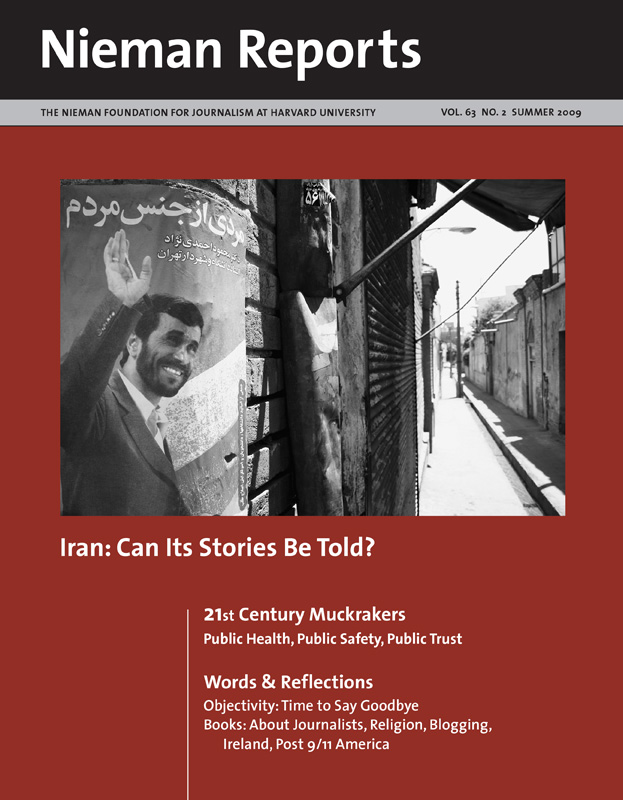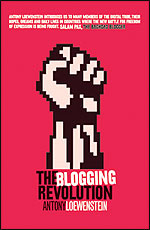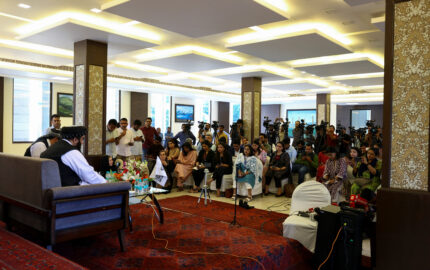I am a blogger, a media critic, and a human rights-oriented journalist. I am also a fan of Australian blogger, freelance writer, and author Antony Loewenstein, because even as he profiles brave online journalists and writers in his “The Blogging Revolution,” he doesn’t leave his voice in the background. Nor does he avoid the deeper media crisis that creates all of the reasons anyone needs for appreciating the value and importance of the proliferating blogosphere.
When I started my News Dissector blog (www.newsdissector.com/blog/) 10 years ago, blogging was an emerging media form. No longer, and here are U.S. stats that offer a glimpse at the profound changes that have taken place (with more added every day):
Whew. With the emergence of so many people expressing themselves so vigorously as part of the Web’s daily media stream, the relationship between their engagement and the established media’s decline becomes abundantly apparent.
The revolution brought about by blogging—which Loewenstein dedicates his book to exploring—focuses on how blogs are being used by “the imprisoned dissidents everywhere.” He is clearly driven in writing this book by the mission of calling our attention to the struggle many dissidents face in countries where it is difficult—and dangerous—to try to get heard in these repressive environments. Governments would not crack down on the Internet and suppress its voices, if bloggers are not articulating messages and information that they find offensive or feel threatened by.
At the same time, Loewenstein is not unmindful of the challenges facing scribblers like himself who live in places where speech is not harassed. As he writes about our changing media, he speaks to issues of corporate consolidation and the economic decline that have led to deep cutbacks of reporters and the dumbing down of news outlets. Given these connections Loewenstein is making about the role blogging now plays throughout the world, it is significant that many news organizations that initially criticized bloggers as not being “real journalists” have now opened their pages to their staff blogs in a mode of “if you can’t fight them, join them.”
At the same time, what real journalism is remains unresolved—as if it ever could be fully defined. In the opening paragraph of his book, Loewenstein offers a quote from the now offline and in-exile Iraqi blogger Riverbend, with whom I’ve corresponded. (Disclosure: This blogger wrote a blurb on one of my books and is quoted in “When News Lies.”) She is quoted as saying:
There isn’t one way to commit journalism. We know that in countries other than ours, reporters are expected to bring their personal perspectives to coverage. Nor is the AP Stylebook a universal guide.
The writers, diarists, commentators, artists and activists Lowenstein invites us to visit in his good read of a “blog around the world” book are a diverse lot, though each of them is challenging government and pushing back against orthodox ideas. He wasn’t content to work from secondary sources. As he traveled to meet bloggers in Iran, Egypt, Saudi Arabia, Syria and Cuba, he found an engaged, talented, sometimes tenacious decentralized tribe of committed and caring people, who speak in many tongues as they confront common enemies in the form of authorities who want them to disappear.
The remarkable diversity among these bloggers is what makes reading about them so interesting. It isn’t possible to boil down their words into sound bites. Each confronts a specific situation, and Loewenstein spends enough time with each to profile them within their circumstance’s context—and thereby offers readers memorable moments and close observations about the culture and their experiences as well as their aspirations. It also helps that Loewenstein writes so well and knows how to tell a good story.
Restricting Online Content
Closer to home, Loewenstein explains how big U.S.-based technology companies have been complicit in helping governments monitor and restrict online content, especially in China, where its Great Wall is now the government’s firewall. His discussion about how American-made software—he names Google, Yahoo!, Cisco Systems, and Microsoft in this vein—has assisted with police prosecution of bloggers highlights the controversial intersection of business interests vs. the bedrock American principle of protecting freedom of speech.
All too often, such corporate practices are not the focus of human rights advocates, such as the Committee to Protect Journalists and Reporters Without Borders, who tend to be more concerned about government actions. In these cases, however, these organizations published detailed accounts from this cyber battleground and sent out action alerts to urge people to channel their outrage into action on behalf of bloggers facing persecution and jail. This is sadly a familiar story, even if an ongoing one.
On occasion, courageous bloggers are given awards for their work. Yet when this does happen, few U.S. news organizations send reporters to interview them or link to their blogs on their own Web sites. Rather than collaborate with them as colleagues, they and their words are marginalized even as crippling cuts in foreign reporting are happening at newspapers and television stations. At the same time, newsroom managers are not acting to make their international coverage more inclusive and decentralized, given the amazing resources that now exist online. There is one news outlet, GlobalVoicesonline.org, where international bloggers’ words are being published and, when necessary, translated into English.
“The Blogging Revolution” (www.bloggingrevolution.com) is not a guide on how to blog nor does it explain why so many people read blogs and write comments on them. Had Loewenstein done so, there would have been plenty of challenges and dilemmas for him to explore—difficulties that go with maintaining a blog and marketing it to find an audience in what’s become a very, very crowded arena. Instead, Loewenstein took on an original topic and did so as a global journalist with a focus squarely on some of the big issues of our time. In short, he has written a book that tells us why blogs matter.
News Dissector Danny Schechter, a 1978 Nieman Fellow, blogs on Mediachannel.org. His book “Plunder: Investigating Our Economic Calamity and the Subprime Scandal” was published by Cosimo Books in 2008 and reviewed in the Spring 2009 issue of Nieman Reports. He can be reached at dissector@mediachannel.org.
When I started my News Dissector blog (www.newsdissector.com/blog/) 10 years ago, blogging was an emerging media form. No longer, and here are U.S. stats that offer a glimpse at the profound changes that have taken place (with more added every day):
- Now more than 12 million American adults maintain a blog.
- More than 147 million American adults use the Internet; 57 million read blogs. More than one-third of today’s blog readers started reading them in 2005 or 2006.
- More than 120,000 blogs are created each day: Nine percent of Internet users claim to have created one, and included among these people are six percent of the U.S. adult population.
- Among bloggers, 1.7 million Americans list making money as one of the reasons they blog. Of companies surveyed, 89 percent indicate that blogs will be more important to their business during the next five years. A bit more than half of blog readers shop online.
- Technorati tracks more than 70 million blogs.
- Nearly one quarter of the Web’s 100 most popular sites are blogs. There are more than 1.4 million new blog posts made each day.
- Blog readers average 23 hours online each week.
Whew. With the emergence of so many people expressing themselves so vigorously as part of the Web’s daily media stream, the relationship between their engagement and the established media’s decline becomes abundantly apparent.
The revolution brought about by blogging—which Loewenstein dedicates his book to exploring—focuses on how blogs are being used by “the imprisoned dissidents everywhere.” He is clearly driven in writing this book by the mission of calling our attention to the struggle many dissidents face in countries where it is difficult—and dangerous—to try to get heard in these repressive environments. Governments would not crack down on the Internet and suppress its voices, if bloggers are not articulating messages and information that they find offensive or feel threatened by.
At the same time, Loewenstein is not unmindful of the challenges facing scribblers like himself who live in places where speech is not harassed. As he writes about our changing media, he speaks to issues of corporate consolidation and the economic decline that have led to deep cutbacks of reporters and the dumbing down of news outlets. Given these connections Loewenstein is making about the role blogging now plays throughout the world, it is significant that many news organizations that initially criticized bloggers as not being “real journalists” have now opened their pages to their staff blogs in a mode of “if you can’t fight them, join them.”
At the same time, what real journalism is remains unresolved—as if it ever could be fully defined. In the opening paragraph of his book, Loewenstein offers a quote from the now offline and in-exile Iraqi blogger Riverbend, with whom I’ve corresponded. (Disclosure: This blogger wrote a blurb on one of my books and is quoted in “When News Lies.”) She is quoted as saying:
Bloggers are not exactly journalists, which is a mistake many people make. They expect us to be dispassionate and unemotional about topics such as occupation and war. That objective lack of emotion is impossible because a blog in itself stems from passion.
There isn’t one way to commit journalism. We know that in countries other than ours, reporters are expected to bring their personal perspectives to coverage. Nor is the AP Stylebook a universal guide.
The writers, diarists, commentators, artists and activists Lowenstein invites us to visit in his good read of a “blog around the world” book are a diverse lot, though each of them is challenging government and pushing back against orthodox ideas. He wasn’t content to work from secondary sources. As he traveled to meet bloggers in Iran, Egypt, Saudi Arabia, Syria and Cuba, he found an engaged, talented, sometimes tenacious decentralized tribe of committed and caring people, who speak in many tongues as they confront common enemies in the form of authorities who want them to disappear.
The remarkable diversity among these bloggers is what makes reading about them so interesting. It isn’t possible to boil down their words into sound bites. Each confronts a specific situation, and Loewenstein spends enough time with each to profile them within their circumstance’s context—and thereby offers readers memorable moments and close observations about the culture and their experiences as well as their aspirations. It also helps that Loewenstein writes so well and knows how to tell a good story.
Restricting Online Content
Closer to home, Loewenstein explains how big U.S.-based technology companies have been complicit in helping governments monitor and restrict online content, especially in China, where its Great Wall is now the government’s firewall. His discussion about how American-made software—he names Google, Yahoo!, Cisco Systems, and Microsoft in this vein—has assisted with police prosecution of bloggers highlights the controversial intersection of business interests vs. the bedrock American principle of protecting freedom of speech.
All too often, such corporate practices are not the focus of human rights advocates, such as the Committee to Protect Journalists and Reporters Without Borders, who tend to be more concerned about government actions. In these cases, however, these organizations published detailed accounts from this cyber battleground and sent out action alerts to urge people to channel their outrage into action on behalf of bloggers facing persecution and jail. This is sadly a familiar story, even if an ongoing one.
On occasion, courageous bloggers are given awards for their work. Yet when this does happen, few U.S. news organizations send reporters to interview them or link to their blogs on their own Web sites. Rather than collaborate with them as colleagues, they and their words are marginalized even as crippling cuts in foreign reporting are happening at newspapers and television stations. At the same time, newsroom managers are not acting to make their international coverage more inclusive and decentralized, given the amazing resources that now exist online. There is one news outlet, GlobalVoicesonline.org, where international bloggers’ words are being published and, when necessary, translated into English.
“The Blogging Revolution” (www.bloggingrevolution.com) is not a guide on how to blog nor does it explain why so many people read blogs and write comments on them. Had Loewenstein done so, there would have been plenty of challenges and dilemmas for him to explore—difficulties that go with maintaining a blog and marketing it to find an audience in what’s become a very, very crowded arena. Instead, Loewenstein took on an original topic and did so as a global journalist with a focus squarely on some of the big issues of our time. In short, he has written a book that tells us why blogs matter.
News Dissector Danny Schechter, a 1978 Nieman Fellow, blogs on Mediachannel.org. His book “Plunder: Investigating Our Economic Calamity and the Subprime Scandal” was published by Cosimo Books in 2008 and reviewed in the Spring 2009 issue of Nieman Reports. He can be reached at dissector@mediachannel.org.




